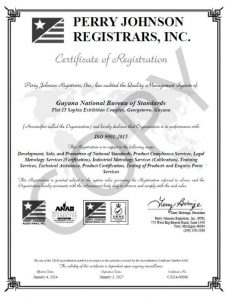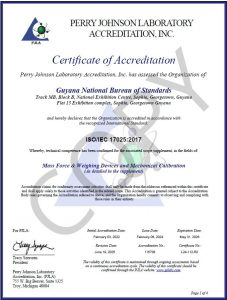As one of the pioneers of low carbon development, Guyana is moving ahead with plans to develop its natural resources – one being natural gas. In fact, the Government in its 2022 national budget, under plans for the transformational Gas-to-Energy project, recognises natural gas as a transition fuel to phase out the use of expensive and carbon-intensive heavy fuel oils.
With this and other developmental projects set to take off, the Guyana National Bureau of Standards (GNBS) is continuously developing new National Standards to meet the needs of stakeholders across the various industries. In 2021, the Standardisation Department of the Bureau developed eleven new Standards and updated eleven others in keeping with its mandate.
Of the eleven new standards now available at the GNBS, four relate to the petroleum industry. Those are the Natural gas for use as a compressed fuel for vehicles —Part 1: Designation of the quality, Specifications for Natural Gas – quality designation, Specifications for Liquefied Petroleum (LP) Gases and Specifications for Fuel Oils. In partnership with local stakeholders, these Standards were all developed at the request of the Guyana Energy Agency (GEA) to effectively monitor the sector.
The National Standard – Natural gas for use as a compressed fuel for vehicles —Part 1: Designation of the quality, was adopted from the International Organisation for Standardisation (ISO 15403). It is intended for use in the evaluation and assessment of the physical and chemical properties of compressed natural gas used for various industrial applications.
The standard aims to provide manufacturers, vehicle operators, fueling station operators and others involved in the compressed-natural-gas vehicle industry with information on the fuel quality for natural gas vehicles (NGVs), required to develop and operate compressed-natural-gas vehicle equipment successfully.
Implementation of the standard will help manufacturers, retailers and drivers to ensure the safety of vehicles and associated equipment needed for fueling and maintenance and to protect fuel systems from the detrimental effects of corrosion or damage. Further, adherence to the requirements of the standard should ensure the NGVs provide satisfactory vehicle performance under all conditions of climate and driving demands.
The Specifications for Natural gas – quality designation standard was also adopted from an ISO Standard (ISO 13686:2013). It specifies the parameters required to describe finally processed and, where required, blended natural gas. Further, the document addresses calorific value, density, odorization, composition and other key factors.
Both National Standards outlined above are voluntary while the Specifications for Liquefied Petroleum (LP) Gases and Specifications for Fuel Oils are compulsory standards, as recently gazetted by the GEA.
The LPG Standard is an adoption of ASTM D1835 and is intended for use in the evaluation and assessment of the physical and chemical properties of liquefied petroleum gases used for various industrial applications. This specification covers those products commonly referred to as liquefied petroleum gases, consisting of propane, propene (propylene), butane, and mixtures of these materials, to be used as domestic, commercial and industrial heating, and engine fuels.
However, it is the responsibility of the user of this standard to establish appropriate safety, health, and environmental practices and determine the applicability of regulatory limitations prior to use.
Meanwhile, the Specifications for Fuel oils is intended to allow petroleum refineries, and other chemical processing plants to appropriately examine and process fuel oils to ensure quality towards safe and efficient use. This National Standard is a modified adoption of the ASTM Standard D396-18a.
This specification covers grades of fuel oil intended for use in various types of fuel oil-burning equipment under various climatic and operating conditions. It is for use of purchasing agencies in formulating specifications to be included in contracts for purchases of fuel oils and for the guidance of consumers of fuel oils in the selection of the grades most suitable for their needs.
The GNBS encourages fuel dealers and other stakeholders within the Petroleum Industry to acquire and implement any of these National Standards relevant to their operation and use. Copies can be purchased from the Bureau at affordable costs.
For further information, contact the GNBS on telephone numbers: 219-0062, 219-0065 or 219-0069. Please visit our website: www.gnbsgy.org and like our Facebook page: gnbsgy






